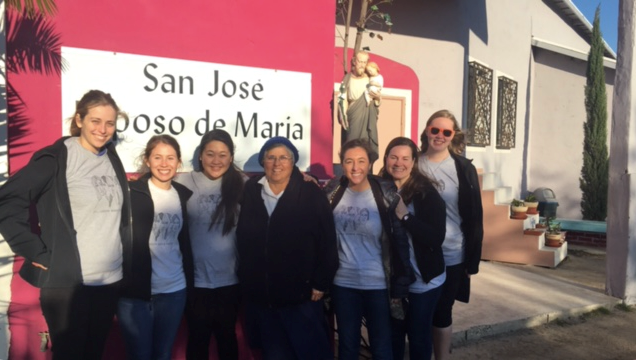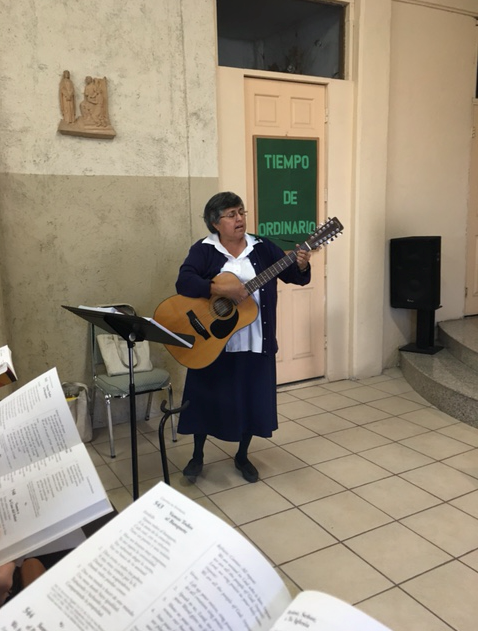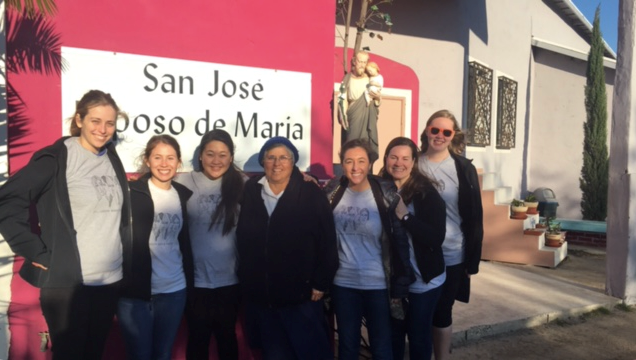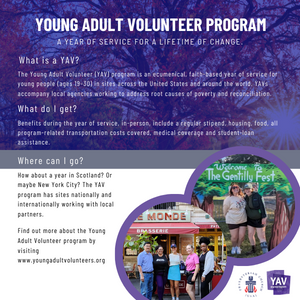In February, the St. Joseph Workers and I headed South to visit Sister Alicia and the people of Maklovio Rojas, Tijuana. Sister Alicia—a Sister of St. Joseph—picked us up in a tough and sturdy white van. The long journey to Tijuana was eye-opening for me to see what it is like to cross the U.S.-Mexico border by car. My own family is from Mexico, so I visit the beautiful country frequently. However, I have never crossed the border to visit in any way other than via plane. It was impressive to see Sister Alicia maneuver her big van in such aggressive traffic! Before heading to Sister Alicia’s home, we made a stop at a local taqueria (taco shop) which made my taste buds jump for joy as I devoured my favorite food – tacos al pastor. Then, we miraculously made it up the muddy, sloping, unpaved roads to her home on top of a hill overlooking the neighborhood. It was this night that we all gathered by the couches with Sister Alicia to hear her story of discernment and vocation.

The St. Joseph Workers posing for a picture with Sister Alicia, in front of her parish in Maklovio Rojas, Tijuana.
I was very humbled to hear Sister Alicia speak so transparently about her journey to becoming a sister. She was so against it for quite a while! In summary, she was involved in her church’s music ministry, and through that she came to know one of the priests very well. It was this priest who kept kindly insisting that she was going to be a sister someday, but Sister Alicia brushed it off every time. One evening, the priest invited her to dinner with a group of nuns, and she hesitantly accepted the invitation. That ‘yes’ to the invitation was the first ‘yes’ which ultimately led to Alicia becoming Sister Alicia. But her journey of discernment and vocation did not end at that. Years after becoming a Sister of St. Joseph, she also discerned her calling to take her ministry to Mexico. Her story made me think of how I came to discern wanting to do a year of service after graduation.
If someone had offered me a volunteer position in a service program as late as the February of my junior year of college, I would have said that was a waste of my time. Truly, I had my future planned quite well. I already knew I would be going to physical therapy school, which is three more years. Why would I postpone my career for another year? That was my mindset. I was fully against it for a while, just like Sister Alicia. However, a service trip I took in March of my junior year to El Salvador was what changed my heart.
I cannot stress enough how moved I was by the history and present state of El Salvador. The solidarity that was shown so authentically in Saint Oscar Romero, the six Jesuit priests, and the four Catholic missionaries inspired me to want to be an example of solidarity as well. St. Oscar Romero spoke out against the Salvadoran government in the years leading up to the Salvadoran Civil War. Though he was the Archbishop of San Salvador and could have lived a life of comfort, he moved into a tiny apartment and spent all his time with the peasants and the oppressed. He was courageous until the day he was assassinated. Likewise, the six Jesuit priests and the Catholic missionaries were in El Salvador despite the intense violence that was rampant throughout the small country. They too gave their lives. Many more voices were silenced by the Salvadoran government during the 12-year war.
Less than 30 years later, El Salvadorans adore St. Oscar Romero and continue to display resilience and hope every day. I witnessed it myself. My time there opened my heart to the realities of the world we continue to live in. People all over the world are oppressed every day. I have been so privileged to have a home, an education, an able body, a country that accepts me. How could I not give a year of service? My ‘no’ quickly turned into a ‘yes’ after that life-changing trip. In this way, my process of discernment was quite simple. However, my journey towards a vocation is nowhere near over!

Sister Alicia leading the music during Mass.
Sister Alicia’s ministry is one of presence—and I have come to understand the importance of presence more during my time in the St. Joseph Worker program. On the Saturday we spent in Tijuana, we witnessed Sister Alicia in action. She took us to Mass, where she led the music beautifully. She was able to be present to the people who wanted to receive Communion in the Church, even when the priest himself did not show up. Our group was introduced to the community, and I appreciated my Spanish-speaking because I could connect with members of the congregation, as well as the children in Sunday school. When I think of Sister Alicia’s ministry in Mexico, I see a spirit of solidarity just like I saw in St. Oscar Romero. The people of Maklovio Rojas adore her as they would adore a mother. In fact, in Spanish she is called Madre Alicia, which translates to Mother Alicia. I see Sister Alicia and I see someone who truly found their vocation. And I am so happy to know that the experiences I have had throughout my year with the St. Joseph Workers have all helped me in coming closer to determining my vocation in life.
If there is one thing I have realized, it is that my ability to speak Spanish is a gift that must not be wasted. Language is often crucial to establishing a connection with someone, so I feel that I must use that to serve a people who are very marginalized at the moment—immigrants. This year of service has also confirmed for me that I am going to be a physical therapist. When I am a clinician, I will strive to be a loving presence to all of my patients, regardless of their country of origin. The violence in El Salvador is unfortunately not an isolated story. People come to the United States begging for safety, fleeing from torture, assault, gang violence, etc. As a physical therapist, I could bring healing to people’s bodies to help them heal not only physically, but also emotionally and spiritually. This is a deep desire in my heart.
Sister Alicia’s loving presence in Mexico has moved me to be sure of how simple solidarity can look, yet how effective it is. Though I might not move across the border for my ministry of presence, perhaps my calling is to be present, inclusive, and welcoming to those who have finally reached safety within the US. I can do this as a professional, but also just as a citizen of the world. To be transparent, I cannot guarantee this is what my vocation is. Discernment is a process, but the people and events in our life are all part of what moves us to determine our vocations in life and the times we need to say ‘yes’. Of this, I am sure.
Be sure to follow CVN’s Blog on Thursdays to hear more from Luz and her fellow Serving with Sisters Contributors!
 Luz Peredo-Muniz is a volunteer with St. Joseph Worker, Orange and a CVN Serving with Sisters Contributor. This blog series is sponsored by our VOCARE Initiative, thanks to the support of the Conrad N. Hilton Foundation.
Luz Peredo-Muniz is a volunteer with St. Joseph Worker, Orange and a CVN Serving with Sisters Contributor. This blog series is sponsored by our VOCARE Initiative, thanks to the support of the Conrad N. Hilton Foundation.



 Thousands of faith-based service opportunities can be at your fingertips with the RESPONSE. Download the latest edition today!
Thousands of faith-based service opportunities can be at your fingertips with the RESPONSE. Download the latest edition today!
